Feel good heating
A home heating solution that uses air to deliver hot water for your heating system. Clever, isn’t it? Choose from our tried and tested range of heat pumps and lead the way in enjoying lower carbon heating^.
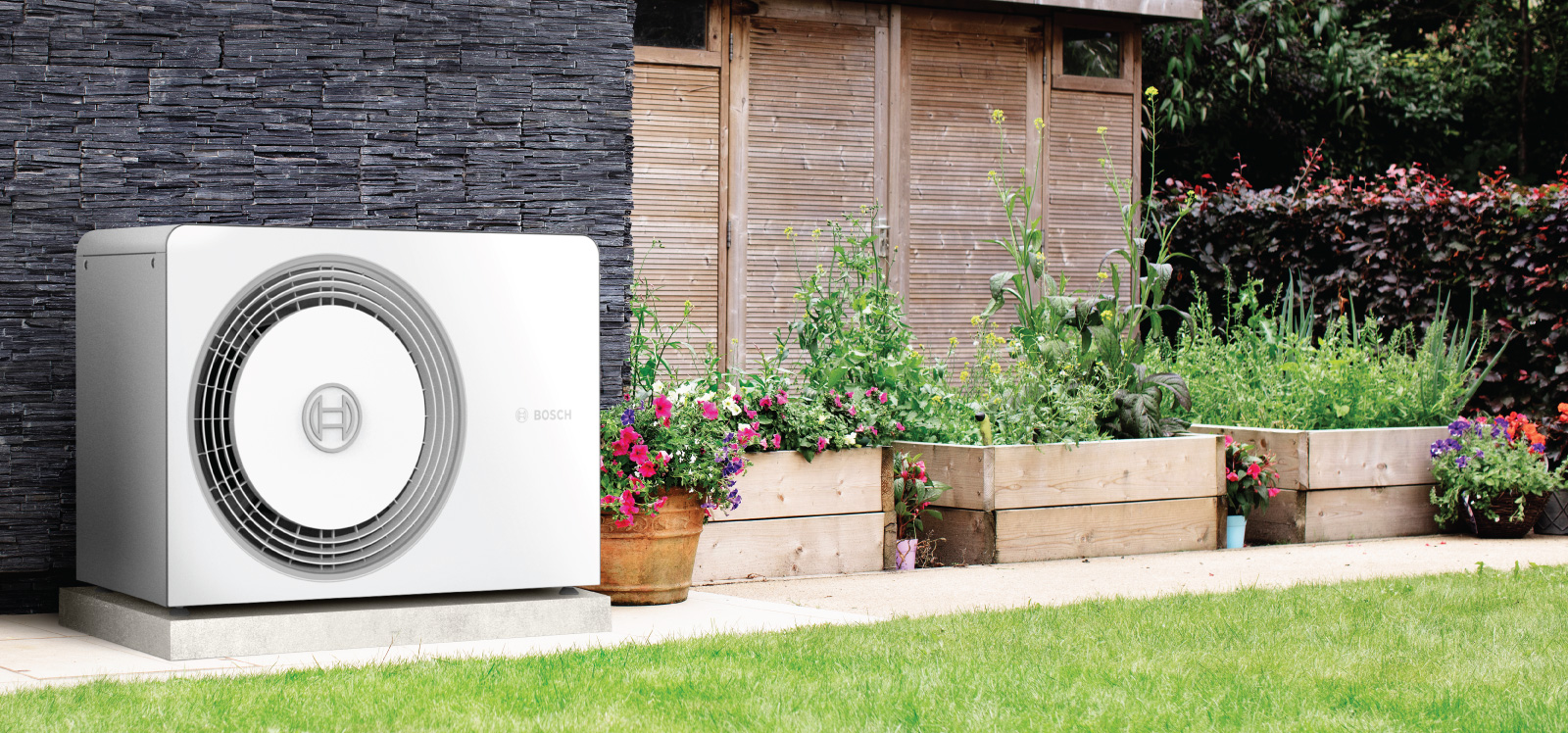
Feel good heating
A home heating solution that uses air to deliver hot water for your heating system. Clever, isn’t it? Choose from our tried and tested range of heat pumps and lead the way in enjoying lower carbon heating^.
An air source heat pump uses the energy in the air to provide heat and hot water to your home. It uses electricity to run the components of a heat pump, to transfer the energy from the heat source into the heat sink or heating system.
Are you thinking of choosing a heat pump? Take a look at our considerations guide:
Download the guide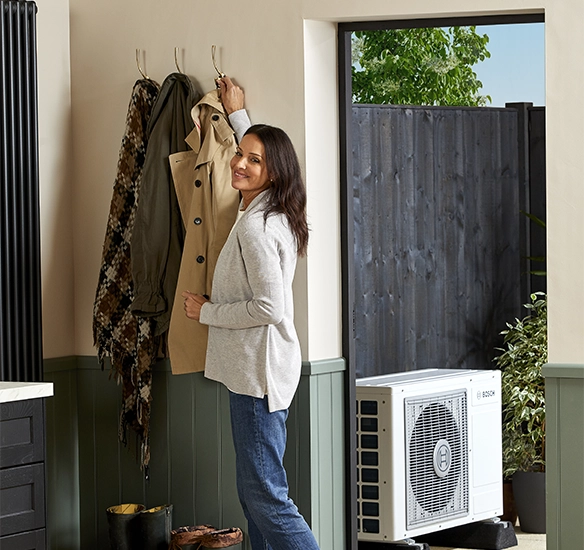
There are a number of grants and incentives available to help with the upfront cost of upgrading to a heat pump, and there is no VAT on heat pumps.
Find out moreFind out more about air source and ground source heat pumps.
Find out if your home is right for a heat pump by using our simple checker. Answer a few simple questions and our expert team will be in touch to discuss your options.
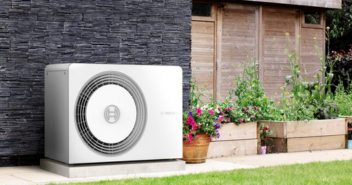
Purpose-built for UK homes and UK weather, the all new CS5800i air to water heat pump an electrified and efficient way to keep you warm, wherever you live.
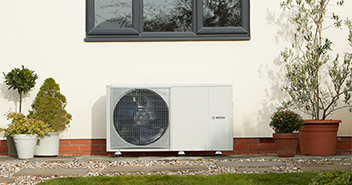
Compact and efficient, the CS2000 air to water full monobloc heat pump gives you lower carbon^ heating and hot water at home.
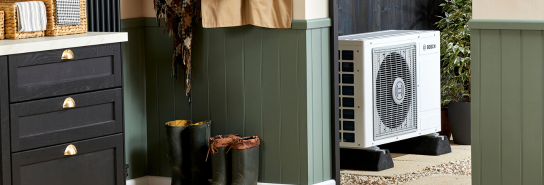
The CS3400i provides heating and hot water all from the natural temperature of the great outdoors.
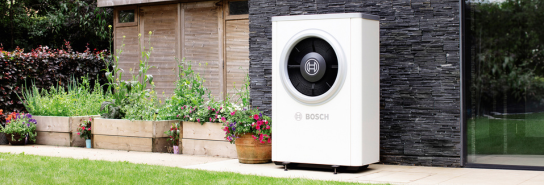
For demanding hot water needs – small to large size homes.
Read our case studies to hear real stories from real homeowners to get inspired as you research which electrified heating system is most suitable for your home.

We’re with you every step of the way. Here’s our tips and tricks for you to get the most out of it.
There are debates over which system is the most efficient however, an air source heat pump is reliant on the outside air temperature which can be a lot cooler than the ground temperature which by comparison is relatively stable. Consequently, a ground source heat pump tends to be more efficient in all outside temperature situations however, they are significantly more expensive to install and are therefore less popular than an air source heat pump.
A heat pump is at its best when it is circulating low temperature water around the heating system in a “steady state” mode. The heat pump is best run from a weather compensation system and allowed to run at all times as dictated by the external weather temperature and the internal room temperature. Because of the low temperature of the heating system water it is not best suited to be operated intermittently like a boiler. A boiler is typically turned on for a couple of hours in the morning, switched off all day and then turned back on at night for 5 or 6 hours.
The high temperatures that a boiler can generate result in it heating the house more quickly than a heat pump can hence the need to run the heat pump in a “steady state” mode and avoid the need to heat the house quickly and from a low base temperature.
The servicing requirements of a heat pump are not as onerous as a boiler however, there are disagreements as to whether the homeowner can undertake this or a service engineer is required.
With a Ground Source heat pump the requirements are more of a check than an activity, the closed loop collection system needs to be checked for the correct levels and efficacy as the fluid also serves as an anti-freeze. The heating system water pressure needs to be maintained and, if the installation has a mains pressure unvented hot water storage cylinder, the servicing requirements of that needs to be considered.
An Air Source heat pump requires the external unit to be kept free of leaves and debris, any filters within also need cleaning or replacing as specified by the manufacturer. And similar to a Ground Source heat pump, any unvented, mains water pressure cylinder needs to be serviced to the manufacturer’s instructions.
The running costs of a heat pump will vary from house type to house type. A well-insulated house built to new building regulation standards will generally be less expensive to run than a gas or oil fi red boiler system providing the heating system flow temperatures are kept relatively low, ideally around 40ºC.
A heat pump will be less efficient and more costly to run when generating higher temperatures, either because the house isn’t well insulated, the radiators are insufficiently sized for the lower temperatures or when generating higher temperatures to produce hot water.
The short answer is yes. This is called a hybrid heat pump and typically consists of gas boiler and air to water heat pump outdoor unit. It works using an outdoor heat pump with an existing or new boiler to provide heating and hot water to the home.
Unlike a standalone heat pump, remedial changes such as resized radiators and fabric improvements are less likely to be required to ensure performance. The hybrid heat pump may utilise the existing system and fabric improvements can be installed over a longer period.
The heat pump would be able to heat the house comfortably during most months but when it reaches colder temperatures, the boiler would support the heat pump to get the house up to temperature. A combi boiler can also provide hot water whilst the heat pump warms the property.
The installation cost of a heat pump will differ from house to house and from size and type of heat pump chosen. As a rule of thumb, an air to water heat pump will cost around £8k to install and a ground source heat pump could be anything up to and around £20k. This though is very dependent on the site and as to whether the existing heating system can be used and the position of the equipment etc.
There are grants available to assist in the investment, sometimes locally and regionally, as well as The Boiler Upgrade Scheme, a government incentive that will assist with the upfront cost of upgrading your heating system with one of our air to water and ground source heat pumps. In addition, there is now no VAT on heat pumps – reducing the cost even further.
An air source heat pump has an outdoor unit that contains a fan to induce the external air into the unit and consequently, they are noisier than a ground source heat pump. Generally, there are few complaints about the noise from a heat pump and when compared with the normal ambient external noise are quite acceptable. For more insight into the sounds of a heat pump, check out our recent article.
^A heat pump when running emits less carbon dioxide than a gas or oil boiler.